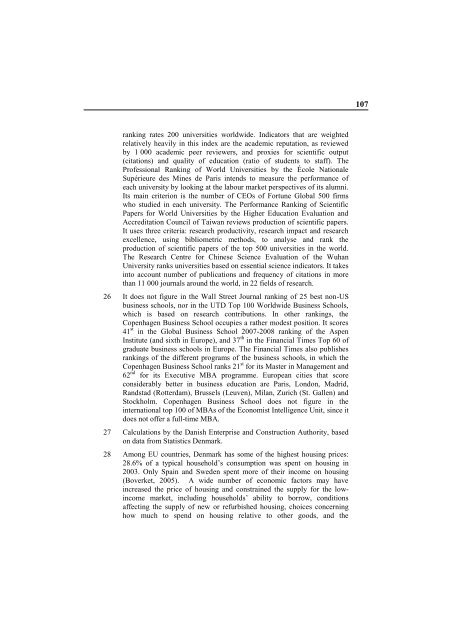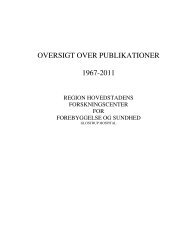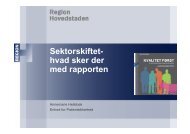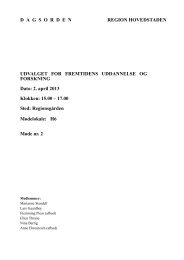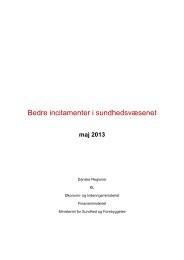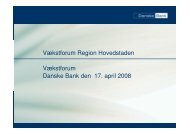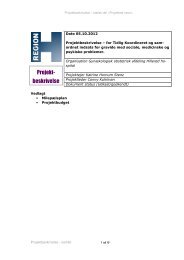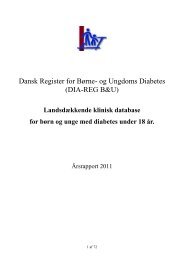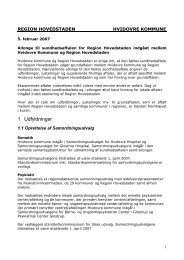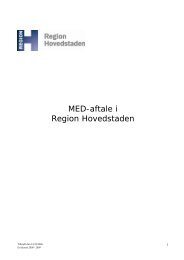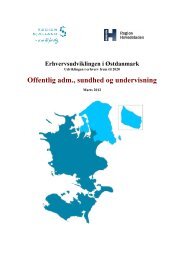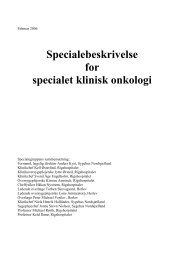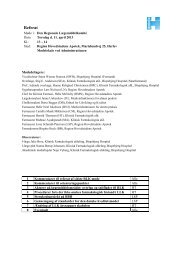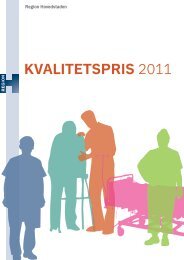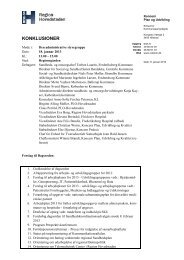Territorial Review Copenhagen - Region Hovedstaden
Territorial Review Copenhagen - Region Hovedstaden
Territorial Review Copenhagen - Region Hovedstaden
You also want an ePaper? Increase the reach of your titles
YUMPU automatically turns print PDFs into web optimized ePapers that Google loves.
107<br />
ranking rates 200 universities worldwide. Indicators that are weighted<br />
relatively heavily in this index are the academic reputation, as reviewed<br />
by 1 000 academic peer reviewers, and proxies for scientific output<br />
(citations) and quality of education (ratio of students to staff). The<br />
Professional Ranking of World Universities by the École Nationale<br />
Supérieure des Mines de Paris intends to measure the performance of<br />
each university by looking at the labour market perspectives of its alumni.<br />
Its main criterion is the number of CEOs of Fortune Global 500 firms<br />
who studied in each university. The Performance Ranking of Scientific<br />
Papers for World Universities by the Higher Education Evaluation and<br />
Accreditation Council of Taiwan reviews production of scientific papers.<br />
It uses three criteria: research productivity, research impact and research<br />
excellence, using bibliometric methods, to analyse and rank the<br />
production of scientific papers of the top 500 universities in the world.<br />
The Research Centre for Chinese Science Evaluation of the Wuhan<br />
University ranks universities based on essential science indicators. It takes<br />
into account number of publications and frequency of citations in more<br />
than 11 000 journals around the world, in 22 fields of research.<br />
26 It does not figure in the Wall Street Journal ranking of 25 best non-US<br />
business schools, nor in the UTD Top 100 Worldwide Business Schools,<br />
which is based on research contributions. In other rankings, the<br />
<strong>Copenhagen</strong> Business School occupies a rather modest position. It scores<br />
41 st in the Global Business School 2007-2008 ranking of the Aspen<br />
Institute (and sixth in Europe), and 37 th in the Financial Times Top 60 of<br />
graduate business schools in Europe. The Financial Times also publishes<br />
rankings of the different programs of the business schools, in which the<br />
<strong>Copenhagen</strong> Business School ranks 21 st for its Master in Management and<br />
62 nd for its Executive MBA programme. European cities that score<br />
considerably better in business education are Paris, London, Madrid,<br />
Randstad (Rotterdam), Brussels (Leuven), Milan, Zurich (St. Gallen) and<br />
Stockholm. <strong>Copenhagen</strong> Business School does not figure in the<br />
international top 100 of MBAs of the Economist Intelligence Unit, since it<br />
does not offer a full-time MBA.<br />
27 Calculations by the Danish Enterprise and Construction Authority, based<br />
on data from Statistics Denmark.<br />
28 Among EU countries, Denmark has some of the highest housing prices:<br />
28.6% of a typical household‘s consumption was spent on housing in<br />
2003. Only Spain and Sweden spent more of their income on housing<br />
(Boverket, 2005). A wide number of economic factors may have<br />
increased the price of housing and constrained the supply for the lowincome<br />
market, including households‘ ability to borrow, conditions<br />
affecting the supply of new or refurbished housing, choices concerning<br />
how much to spend on housing relative to other goods, and the


